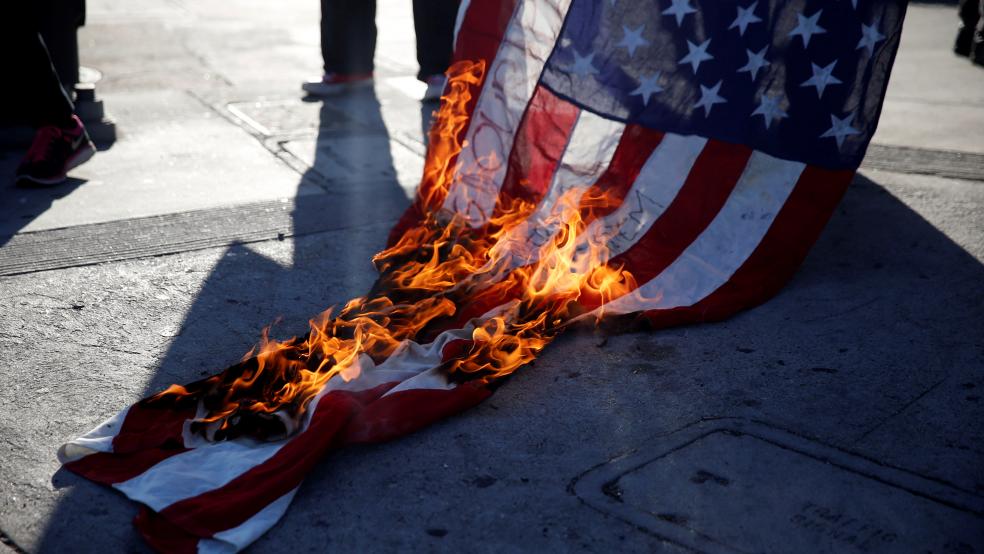On Twitter Tuesday morning, President-elect Donald Trump took a break from abusing CNN and citing right-wing website assertions of voter fraud in an election that he actually won to take a strong policy position on an issue that, well, nobody was talking about.
At 6:55 a.m., apropos of absolutely nothing, Trump tweeted out, “Nobody should be allowed to burn the American flag -- if they do, there must be consequences - perhaps loss of citizenship or year in jail!”
Related: Will Democrats Stand Up to Trump? Here’s Their First Test
There are multiple levels of oddness in that tweet, not least of which is that the issue of flag-burning isn’t one that has a whole lot of salience with the public right now and hadn’t been addressed in any significant way during the just-concluded presidential campaign.
Also, there are already two strong Supreme Court precedents holding that flag-burning is a legal form of expression that is protected under the First Amendment to the Constitution: Texas v. Johnson from 1989, and U.S. v. Eichman from 1990.
Nobody should be allowed to burn the American flag - if they do, there must be consequences - perhaps loss of citizenship or year in jail!
— Donald J. Trump (@realDonaldTrump) November 29, 2016
Finally, the tweet was strange because one of the most recent high-profile efforts to make flag burning a federal crime was spearheaded by none other than Trump’s Democratic opponent in the presidential election, Hillary Clinton.
In 2005, then-Senator Clinton introduced the Flag Protection Act, which prohibited the destruction or damaging of the flag “with the primary purpose and intent to incite or produce imminent violence or a breach of the peace, and under circumstances in which the person knows that it is reasonably likely to produce imminent violence or a breach of the peace.” Violators could face up to $100,000 in fines and up to a year in prison, but the proposal never became law.
Related: Why Trump Should Welcome an Election Recount
While jailing political protestors is something most Americans associate with despots and dictators, laws against flag desecration, including some that carry prison sentences, are surprisingly common even in advanced democracies, including close U.S. allies. In Europe, flag desecration laws exist in Austria, Finland, France, Germany, Italy, and Portugal. In more totalitarian states, like China, and those ruled by a monarchy, like Saudi Arabia, the penalties for flag desecration can be extremely harsh.
Trump’s suggestion that a fitting punishment for flag-burning could be the loss of citizenship appears to be his own personal touch and is a bit problematic legally. The only way a native born U.S. citizen can be involuntarily stripped of citizenship is if he or she is found guilty in a court of law for “committing any act of treason against, or attempting by force to overthrow, or bearing arms against, the United States.”
Given past Supreme Court precedents, though, the chances of even a Trump-friendly Congress coming up with a bill outlawing flag-burning that would survive a court challenge seem low. And if Trump follows through on his promise to nominate a like-minded conservative to replace the late Justice Antonin Scalia, the chances seem even worse.
Related: Looks Like Most Voters Disagree With Trump on Just About Everything
It was Scalia himself, having twice joined decisions on the Supreme Court that upheld flag-burning as a form of protected speech, who succinctly summed up the reasons why actions that may give grave offense to many are still legal in a Democracy that prides itself on protecting civil liberties.
“If it were up to me, I would put in jail every sandal-wearing, scruffy-bearded weirdo who burns the American flag,” Scalia said during a speech in 2015. “But I am not king.”





